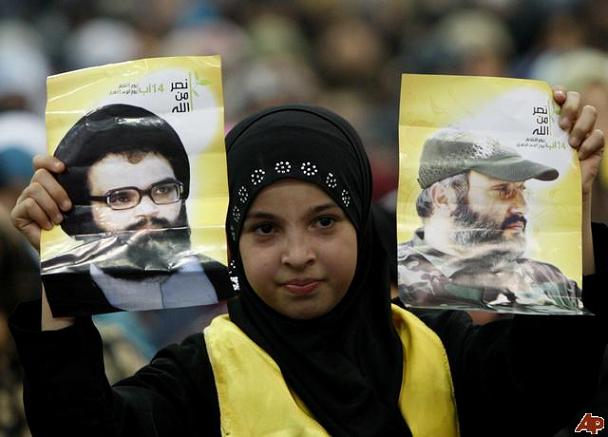Guerillas in Government? Hezbollah solidifies its position
New in Ceasefire, Politics - Posted on Monday, January 31, 2011 0:00 - 0 Comments
 By Omayr Ghani
By Omayr Ghani
The 2009 elections in Lebanon saw $30m dollars spent on plane tickets largely by the pro-western parties of Saad Hariri’s March 14 bloc and their Saudi allies in order to fly in an estimated 48,000 Lebanese ex-pat supporters (in a country with a voting population of less than 1.5m) from wealthy enclaves in places as far a field as Canada and Australia. At the same time only a quarter of Beirut’s residents could vote without returning to their remote districts of origin thus disenfranchising the poor, mostly opposition-supporting labourers from the south of the country.
Despite these obstacles the March 8 opposition bloc consisting of former General Michel Aoun’s Free Patriotic Movement, Hezbollah and a number of smaller left wing parties managed to win 55.5% of the national vote; the vagaries of Lebanon’s electoral system however left the bloc with only 57 seats out of 128 as opposed the 71 seats won by the March 14 bloc. In addition to the common problem of electoral boundaries representing disproportionate numbers of seats the discrepancy is also due to Lebanon’s uniquely confessional system (with parallels in post-occupation Iraq and Northern Ireland) in which a fixed number of seats are also allocated according to each of Lebanon’s officially recognized 18 sects (the parliamentary positions of President, Prime Minister and Speaker of the House are also permanently allocated to a Maronite Christian, Sunni and Shia respectively).
As well as encouraging sectarian politics and limiting cross-denominational unity on economic issues the system is based on decades old census data leading to a situation in which Shia Muslims who represent 45% of the population (and are much more likely to support opposition parties such as Hezbollah and Amal) are only allocated a maximum of 27 seats (21% of the total.)
The position of the March 8 bloc was boosted, however, a month after the election when the Progressive Socialist Party and 5 other MPs defected from the pro-western March 14 alliance to form a 3rd and independent bloc known as Democracy Gathering; depriving March 14 of its majority and making its leader, then Prime Minister Saad Hariri more dependent on Hezbollah to form a Cabinet.
Tensions came to the fore this past month however shortly before UN’s Special Tribunal for Lebanon issued indictments for the assassination of Saad Hariri’s father (also an ex-PM) Rafic in 2005. While his death had been commonly attributed to Syria leaked documents from the US-backed UN investigation suggested that Hezbollah was now being blamed leading Rafic Hariri (who had also previously blamed Syria for his father’s death) to pledge to “work to stop the activities of the tribunal and to cancel the work protocol between the government and the tribunal.”
Despite this pledge however, two weeks later when Hezbollah called an emergency cabinet session to discuss the Lebanese government’s reaction to the imminent indictments Hariri’s Future Party refused to do so prompting Hezbollah to withdraw from the March 14 led government causing it to collapse and Hariri’s term as Prime Minister to come to an early close.
During the constitutional crisis Syria’s president Bashir al Assad and Iran’s Foreign Minister Ali Salehi emphasized “the importance that solutions come from inside these countries according to their peoples’ interests to help maintain their security and stability” whilst the United States warned the larger the role of Hezbollah in the formation of a new government “the more problematic” it would be for ties between the countries and threatened to withdraw the 100’s of millions of dollars in military and economic aid it gives annually to Lebanon. Though such sabre rattling seemed to only increase support for the organization as Walid Jumblatt pledged the votes of at least 7 MPs from Democracy Gathering for Hezbollah’s candidate for Prime Minister Najib Mikati, who with the additional support of the rest of March 8, was successfully elected (68-60) last Tuesday giving Hezbollah unprecedented influence in the country.
The Israeli deputy Prime Minister has described Mikati’s election as “a very, very dangerous development,” likening it to “an Iranian government on Israel’s northern border” while retired Israeli general and national security advisor has stated that Hezbollah’s increased role in the Lebanese government means “It will be much easier to explain to the international community why we must fight against the state of Lebanon,” increasing fears that Israel may use the findings of the Rafic Hariri Investigation, alongside Hezbollah’s continued armed presence, as a pretext for yet another invasion of Lebanon in order to prevent the movement’s defiant stance from spreading across the Arab world.
Israel has conducted military drills on the Lebanese border, fired shots into Lebanese territory from positions in Sheba’a Farms (Lebanese farm land that Israel has occupied since 1967) and violated its airspace with reconnaissance planes this month in what seems to be efforts to provoke Hezbollah, whose armed wing has grown significantly (even acquiring anti-aircraft weaponry) since its last confrontation with Israel, into entering into another conflict.
Whilst the UN tribunal have now issued its indictments, its findings are to be kept secret until late February when the trial is due to begin (now without Lebanese governmental backing) at which point, if Hezbollah figures are indeed named, we could well see a marked escalation in calls for a military assault on Lebanon from Israel however with the guerrilla force and its allies now exercising control over the Lebanese army (which has never involved itself in an Arab-Israeli war since sending a token 1,000 troops to try prevent the Israeli occupation of Palestinian territory in 1948) the reaction to such an invasion could well, as Hezbollah’s Secretary General Hassan Nasrallah has repeatedly warned, “change the face of the region”
Omayr Ghani is Ceasefire‘s political editor.


Leave a Reply